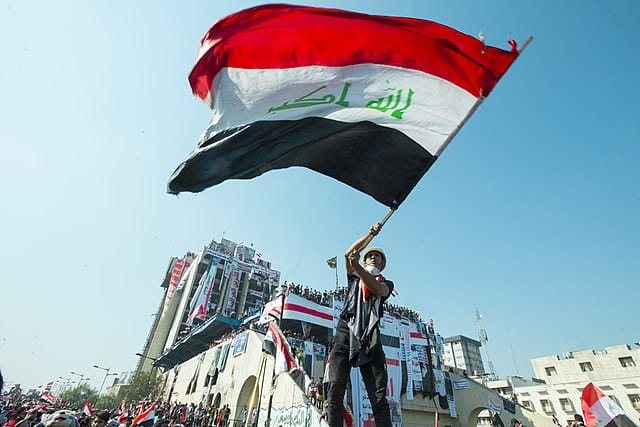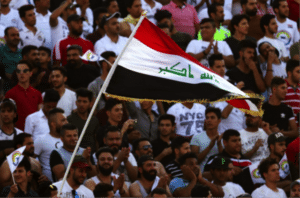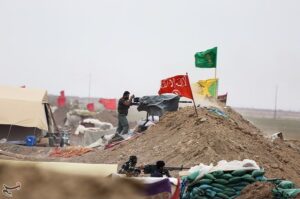Photo: Iraqi protester during the October Revolution in 2019 – Wikimedia Commons
1 October 2019, the starting point of a series of violent protests in Iraq, the largest the country has seen since the fall of Saddam Hussein. The protests followed dissatisfaction with corruption, unemployment and government ineffectiveness. It led to early parliamentary elections in October 2021 that should have induced improvement. Although a ‘new’ government has been in place for a year now, little has changed in concrete terms. The government has little support from the Iraqi people, especially the younger generation. Iraq is in a hopeless political situation. With the approaching four-year anniversary of the protests, the question again arises whether and how a way out of the impasse is possible.
Desperation among population
Distrust in politics is high in Iraq. Nothing has changed since the protests. For two years, demonstrations took place with very high frequency. As many as 600 people were killed and tens of thousands injured, as a result of the violent crackdown. The country is still in economic malaise and citizens live in uncertainty. The huge revenues from oil exports are not finding their way to most of the population. Unemployment has risen to around 15 per cent in recent years. The dependence on oil exports makes the economy very vulnerable. Hope for change is hard to find.
Tradition without support
The underlying core of the protests was dissatisfaction with Iraq’s political system. After the fall of Saddam Hussein in 2003, the United States implemented a democratic system that attempted to divide power in the country along ethnic lines. This would give everyone a fair share of power and prevent domination of some over the others. A fine plan on paper, but in reality it leads to a very undemocratic way of conducting politics. Since the first elections in 2005, all parties together form a coalition, a ‘national unity’ government. Important positions and ministries are divided according to the number of votes. The most important ministries naturally go to the largest party. Following the principles of clientelism, posts are given to recurring figures who act only in self-interest. The clientelist system accounts for the extraordinary fact that the Iraqi government is the country’s largest employer, with as much as 39% of employment. So-called ‘ghost jobs’ play a big factor in the economic malaise – the elites use the public sector as a patronage system. Support the political elite and in return you are rewarded with a non-existent job that does drain the state treasury. The tenure of some positions is fixed – for instance, the president is always of Kurdish origin, the prime minister of Shia, and the parliament speaker of Sunni. Since all parties join the coalition and divide posts within the party, there is no opposition. Iraqi people are side-lined and there is no check on the government – everyone joins the game which means there is no accountability to the people. The system has proved to be ineffective and very unpopular with the people.
Attempt at healthy democracy
Prominent politician and Shia cleric Muqtada al-Sadr attempted to form a majority government after the 2021 elections, against the tradition of ‘national unity’ governments. He is a well-known figure in Iraqi politics, in part because of his father Ayatollah Mohammad-Sadiq al-Sadr who meant a lot to Iraq. Al-Sadr garnered great support through his efforts against the US occupation since 2003. He won the elections – 73 seats – and planned to form a majority with Kurdish and Sunni parties to the necessary 165 seats in total for a majority. This would be unprecedented and mean that some powerful parties would fall out of government for the first time. A coalition of the most prominent Shia parties united as the Coalition Framework (CF) against Al-Sadr’s coalition attempt.
Malaise persists
Dissatisfaction among these parties led to violence. Political parties in Iraq have historically included military branches. These militias were formed during the many conflicts within Iraq. All parties that were anti-Hussein and later anti-ISIS were supported militarily by the US in particular. The weapons remained in the possession of the parties. This creates a situation where if they cannot agree verbally, there is the possibility that the dispute will be fought using weapons. In the summer of 2022, disgruntled Al-Sadr supporters occupied the parliament building in Baghdad, as forming a coalition led by Al-Sadr had failed.
In October 2022, a prime minister – Mohammed al-Sudani (CF) – was finally appointed, who then managed to form a government. The government included many old faces, demonstrating that the hard-fought protests of 2019 led to nothing. Dissatisfied with the stalemate since the 2021 elections, Al-Sadr, with its 73 seats, resigned parliament in an attempt to delegitimise it. This makes hundreds of thousands of Al-Sadr supporters even less content with the current situation. It is now four years since the protests and discontent still prevails among the Iraqi people. Besides politics being old wine in new bottles, Iraq is not exactly doing well economically either. The current instability and discontent is not only a problem for Iraq itself, but also for the region and far beyond – instability is the breeding ground for extremist organisations. So getting Iraq on track is of international importance.
The one positive thing the protests have led to is the development of a wide network of protest movements and even political parties – although not everyone wants to associate themselves with politics. International support is needed to push the country further in the right direction. The focus should not be on just stability and stopping migration – the core issues of many foreign policies that actually perpetuate the regimes – but on support for democratisation and activism, to give the people a chance to stand up to the corrupt, kleptocratic government.
Written by Timon Driessen



